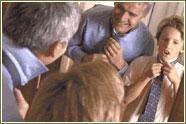
I grew up in a suburban community of New York City. Being Jewish meant being a part of the majority where I was raised. As a child, I, naturally, thought most people were Jewish. However, unlike other Jewish families, we never went to synagogue nor did I ever attend a religious school program. My father, a physician, violinist and self-proclaimed atheist never imagined sending me or my brothers to the local temple. My childhood revolved around music. In my case, twice weekly cello lessons since the age of 7 and practice sessions of at least 90 minutes on the other 4 days of the week (Sundays were not required). When I turned 11, my mother insisted that I receive some Jewish education. She found a cantorial student living in the area who came to our house once-a-week to tutor me in Hebrew language, prayers, holidays, traditions, lifecycle and history. I looked forward to those sessions and, after two years, he performed a Bar Mitzvah ceremony for me in our backyard. Everyone thought it was great! So it was for my two younger brothers as well.
Years later, the combination of my spiritual journey as well as my musical passion, led me to study to become a cantor. A cantor is Jewish clergy who works alongside a rabbi, but is responsible for the musical aspect of synagogue life and worship. To be a cantor, in addition to a strong Jewish educational background, one must possess a fine singing voice and musical competence to be able to direct choirs and create musical programming. My father was somewhat stunned, but probably had seen it coming.
Although the ritual of Bar Mitzvah dates back to the Middle Ages and has been a staple in our tradition ever since, the Reform Movement in its early years abandoned it. Along with many of the ritual laws and minhagim (customs), the Reform Movement felt that Bar Mitzvah was no longer a pertinent ritual. A boy, only 13 years in age, no longer had the adult status in society that he once had. Reform introduced the ceremony of confirmation whereby a group of young men and women would become confirmed together around the age of 16 following years of education. However, the power of tradition eventually prevailed. Reform brought back Bar Mitzvah and, even Bat Mitzvah.
Today, the Bar and Bat Mitzvah ceremony, followed by its festivity, is central to synagogue life. Many families affiliate with a synagogue in order to ensure their child become Bar/Bat Mitzvah. The requirements are stringent. In most, a synagogue requires the child to enroll in religious school beginning in 3rd grade (some allow 4th grade as a starting point). Children must be consistent in their attendance, grades and must attend Shabbat services regularly.
Today, especially with the increase in interfaith marriages, the choice to send a child to a religious school, whether it is Jewish or Catholic or other, is not an easy one to make. Parents often choose not to send their children to any yet to maintain the religious traditions associated with the holidays at home. Just as one born of a Jewish mother is no less Jewish if he never had a bris, a Jew becomes Bar Mitzvah according to Jewish law, simply by reaching the ‘age of majority’. No other conditions apply. Nonetheless, knowing that a ceremony is not necessary to one’s becoming Bar/Bat Mitzvah means little to many families and their children who want to experience this meaningful lifecycle event.
The changing demographics also present challenges even when both parents are Jewish. The ‘Jewish’ communities of years ago are becoming less so while communities that had few Jewish families have more than in the past. The reality that people often choose to live where their work is as opposed to choosing a community based on demographics has often meant that the nearest synagogue that is right for them is a considerable distance from their homes. This is true especially outside of the major metropolitan areas. Getting a child to religious schooling presents so many challenges that previous generations did not face in the same way. There are more extra-curricular activities that children are involved in and the pressure of academic achievement seems higher now than when I was a boy. Also, whereas my mother, like so many from my generation, were primarily home-makers, single incomes are no longer sufficient for so many. Of course, there is also the expectation that women pursue careers no less so than men. Even television families almost invariably present two working parents, this is so different than the shows we watched decades ago.
There are other options for these unaffiliated families who wish to celebrate their child’s becoming a Bar or Bat Mitzvah. A Bar/Bat does not have to take place in a synagogue which may surprise many. It can take place anywhere that there is a minyan (10 Jewish adults) present for public prayer and public reading of the Torah. A synagogue is holy only as a place of worship, but not intrinsically so. With the relative calm in Israel, more families are choosing a Bar/Bat Mitzvah there. It is an option that allows families from all backgrounds to celebrate this wonderful lifecycle event and to visit a country that I believe all Jews must visit. Families come back from such an experience gloating over how wonderful and meaningful it was.
Israel is not always an easy option. It can be expensive and with younger children in the family, not always the kind of magical, historical experience for the entire family. It also involves at least a 10-day trip. There are many Jewish clergy, rabbis and cantors who welcome the opportunity to teach Judaism, prepare and preside over a ceremony that takes place in any locale other than a synagogue which simply cannot do so. No Jewish child whether the child of two Jewish parents or just one, should be denied the opportunity to have this special lifecycle ceremony.
Cantor Ronald Broden serves Congregation Shaarei Shalom in Riverdale, NY and resides in Westchester County.





